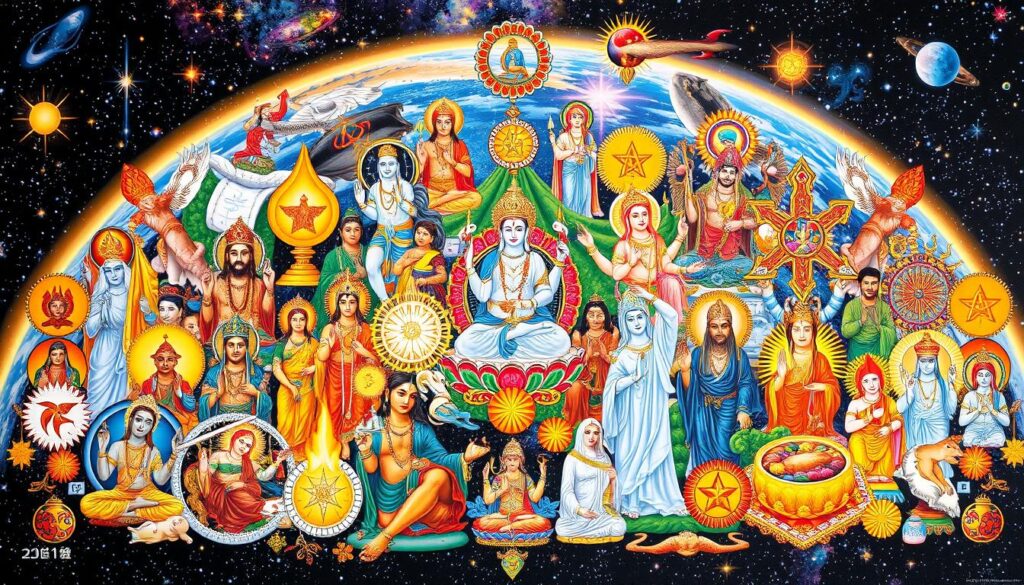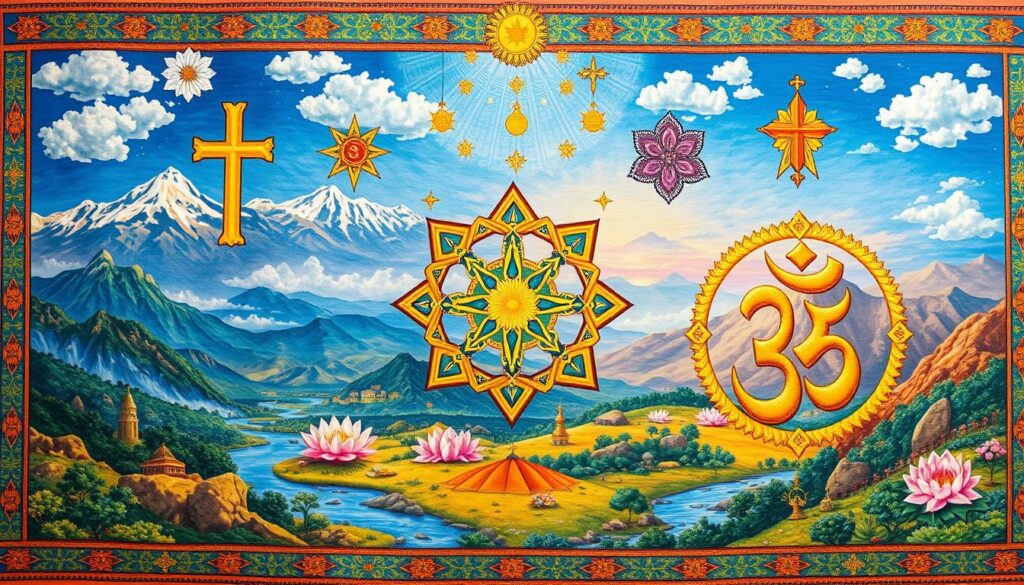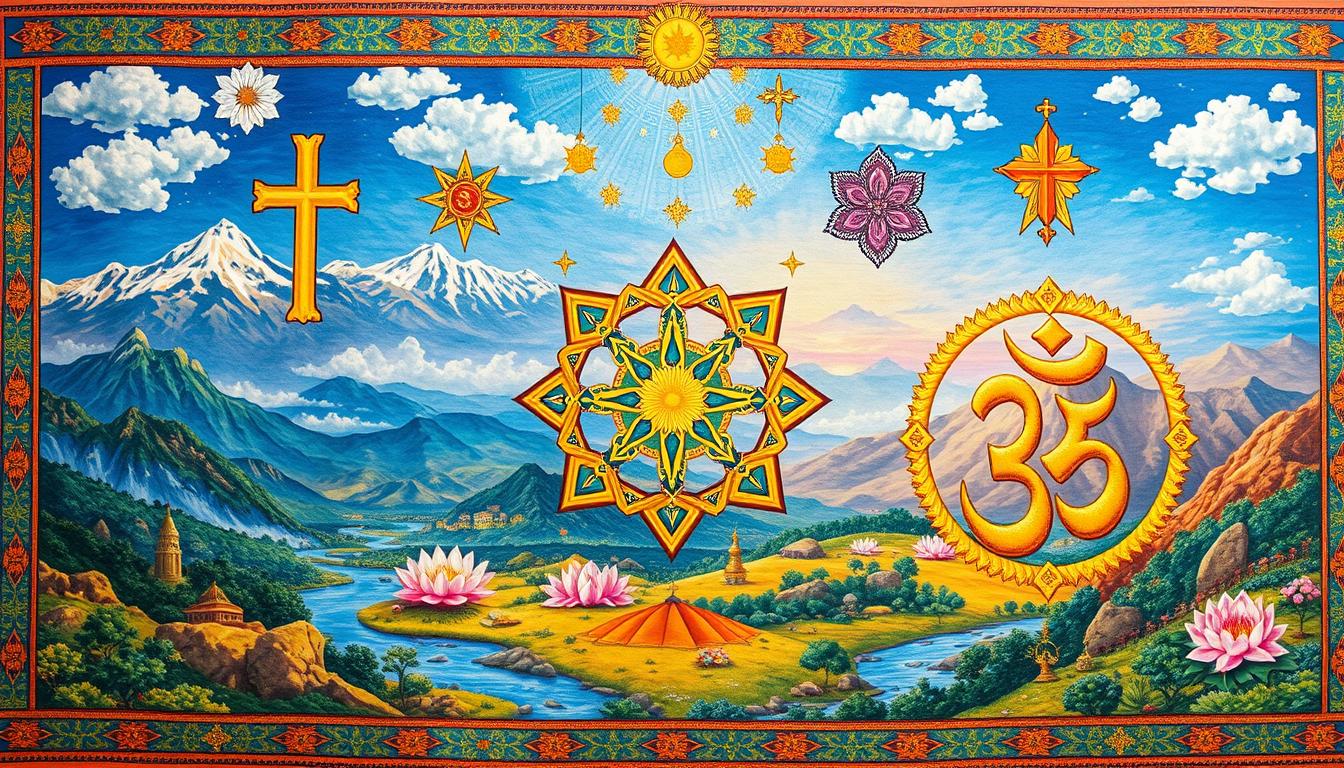I’m on a journey to learn about the world’s many faiths. I’m fascinated by the different religions and gods that shape our lives. From Hinduism’s ancient wisdom to Buddhism’s kindness, each faith gives us a special view of the world.
Welcome to checkreligion.com
Exploring Religions and Gods !
Figures like Abraham, Moses, and Mary show us the strength of faith. They teach us about the power of community and finding our purpose.
Exploring faith, I see how our beliefs grow. We start with simple ideas and then learn more about complex faiths. Faith can bring us together, overcoming fear and pride.
I hope this article shows how faith traditions are key to who we are. They help us understand truth and kindness in our world.
Key Takeaways
- Faith is an evolving journey shaped by personal experiences and cultural contexts.
- Understanding spirituality requires an appreciation of diverse belief systems.
- Historical figures exemplify faith’s importance in realizing purpose and overcoming challenges.
- Faith traditions can foster unity in diverse communities.
- Each religion brings unique insights into the nature of gods and the divine.
- Personalized spiritual paths are becoming more common in today’s society.
The Essence of Spirituality

Spirituality is a big part of who we are. It changes how we see life and the world. Around the world, people have many beliefs and ways to practice spirituality.
As I learn about the essence of spirituality, I see how different cultures view it. Each culture has its own way of understanding spirituality. This makes our world rich and diverse.
Understanding Spirituality in Different Cultures
Every culture has its own way of showing spirituality. They use sacred texts, rituals, and philosophies to understand it. For example, Hinduism talks about Brahman, a spirit that connects everything.
On the other hand, Christianity focuses on a personal relationship with God. It’s about love and being saved. This shows how different cultures see spirituality, making our lives richer.
The Role of Spirituality in Daily Life
Spirituality is important in my daily life. It shapes my values and actions. Activities like meditation and prayer help me feel connected to something bigger.
Understanding the essence of spirituality means seeing its role in our lives. It helps us be more mindful and thankful. This makes us appreciate the moment and connect with others better.
| Cultural Expression | Example of Spiritual Practice | Associated Beliefs |
|---|---|---|
| Hinduism | Puja (worship) | Connection with Brahman |
| Christianity | Prayer | Relationship with God |
| Buddhism | Meditation | Mindfulness and enlightenment |
| New-Age Spirituality | Healing crystals | Energy and personal growth |
Exploring different views of spirituality helps me grow. Each new experience teaches me something about life. It makes me question old beliefs and stay open-minded.
This journey shows us all want to connect with something greater. It’s a universal desire that brings us together.
Major World Religions
Exploring major world religions shows a rich mix of beliefs and traditions. Christianity focuses on Jesus Christ and one loving God. Islam centers on Allah and five key pillars for a Muslim’s life.
Hinduism has complex traditions around deities and life’s cycles. Buddhism teaches self-discipline and seeking Nirvana.
A Brief Overview of Christianity
Christianity is based on one loving God. It says Jesus Christ died for our sins, offering eternal life. Over 2.4 billion people follow this faith.
The Core Beliefs of Islam
Islam believes in one powerful God, Allah. Muslims follow the Quran and five pillars. This faith has about 1.9 billion followers.
Exploring Hinduism’s Rich Traditions
Hinduism has many practices and beliefs. It believes in reincarnation and three paths to spiritual perfection. About 1.2 billion Hindus live mainly in India, Mauritius, and Nepal.
The Philosophy of Buddhism
Buddhism is about seeking enlightenment, not worshiping deities. It says suffering comes from cravings and delusions. Buddhists aim for Nirvana through self-discipline and meditation, appealing to about 500 million followers.
Religions and Gods

Exploring deities shows the amazing variety in religions. Each faith sees the divine in its own way. This leads to unique spiritual practices and beliefs. Knowing the difference between monotheism and polytheism helps us appreciate the diversity of religions.
The Concept of Deities in Various Faiths
Many religions focus on deities. Polytheism believes in more than one god. This creates a rich world of figures that show different sides of life and nature.
Each god has its own story, strengths, and weaknesses. This makes them interesting and complex. For example, Hinduism has a huge number of gods. Yet, some people focus on one god, showing how the idea of deities changes with culture.
Monotheism vs. Polytheism
Monotheism and polytheism are two different views of the divine. Monotheistic religions like Christianity, Islam, and Judaism believe in one God. Christianity even adds a twist with the Trinity—Father, Son, and Holy Spirit.
Polytheism, on the other hand, has many gods and goddesses. Each has its own personality and role in life. Polytheistic religions have rituals for different gods, showing different parts of nature or ethics.
This comparison shows the differences in beliefs. It also shows how these beliefs shape spiritual experiences and community. This helps us understand religious diversity better.
The Evolution of Belief Systems
Looking at how belief systems have changed over time is really interesting. It shows how old traditions turned into organized religions. This change was influenced by many things like culture, politics, and how societies grew.
This journey through time helps us understand our current religious world better.
Historical Context of Religion Development
Beliefs started changing thousands of years ago. Early beliefs, like animism, showed people’s deep connection with nature. As societies got bigger, leaders like priests came along.
This led to religions with many gods. By about 3,000 years ago, some beliefs became more common. They helped people feel connected to something bigger than themselves.
Religions like Judaism and Christianity taught important values like kindness and respect. The use of language and symbols helped spread these beliefs. This made it easier for people to share rituals and cultural practices.
Modern Changes in Religious Practices
In recent years, religious practices have changed a lot. The world has become more connected, mixing old beliefs with new ideas. This shows how faith keeps evolving.
Religious practices can adapt to new social changes. This shows how beliefs can grow and change in our fast-paced world.
Today, we see old traditions meeting new ideas. This shows how spirituality is always changing and growing.
| Period | Key Developments | Belief Systems |
|---|---|---|
| Prehistoric | Emergence of abstract thought; animism | Animism |
| 500,000 years ago | Expansion of neocortex; complex social behaviors | Early belief systems |
| 3,000 years ago | Universal religions develop; values of compassion | Judaism, Christianity, Hinduism |
| Modern Era | Mixing traditional beliefs with contemporary ideas | New Age spirituality |
The Significance of Worship

Worship is key in almost all religions. It connects us to something greater through rituals and group activities. It shows how worship shapes our lives and brings us together.
Learning about different worship styles helps us value spiritual diversity. It shows us how people around the world express their faith.
Forms of Worship Across Different Religions
Every faith has its own ways of worship. Some are loud and colorful, while others are quiet and peaceful. Here are some common ways people worship:
- Prayer
- Ritual drama
- Dancing
- Ecstatic speech
- Veneration of sacred objects
- Silent meditation
- Sermons
- Sacred music
These ways help people and groups feel connected to something special. They make us feel part of a community.
The Impact of Rituals on Community and Identity
Rituals play a big role in our lives. They help us feel like we belong together. In old times, rituals kept communities strong and united.
Looking back, we see how old rituals shape our beliefs today. Even though fewer people go to church, many still believe in something greater. This shows worship’s lasting importance in our lives.
The Role of Faith Traditions
Faith traditions shape how we see the divine. They give us ways to understand our lives and experiences. For many, these traditions are key parts of who they are and their communities.
In the United States, 56% of adults say religion is very important. This shows how much faith traditions mean to people.
How Traditions Shape Our Understanding of the Divine
These traditions affect our views on spirituality and right and wrong. For example, the Qurʾān teaches that faith is linked to a higher power. This changes how believers see the world.
The First Letter to the Corinthians talks about faith as being sure and strong. This adds depth to our understanding of being connected to something greater. Thinkers like Paul Tillich and George Santayana also explored faith and trust across cultures.
Faith Traditions and Their Global Influence
Today, many faith traditions exist worldwide. In the U.S., 85% of black Protestant churchgoers see religion as very important. But, only 31% of Jews and 35% of Buddhists feel the same.
This shows a complex world where faith traditions sometimes work together and sometimes don’t. In places like Austin, Texas, different faiths coming together can help us understand each other better.
Overall, faith traditions give us personal meaning and help us see the world in a bigger way. By learning from each other, we can have better conversations and work together on big issues.
Understanding Divine Beings
Exploring divine beings brings us a world of stories and traits. These stories shape our view of spirituality. They show us the many sides of gods and goddesses from different cultures.
These tales teach us about life and morals. They connect with our own experiences in amazing ways.
Characteristics of Gods and Goddesses
Gods have many traits, but some are common. In many religions, they are seen as all-powerful and all-knowing. This makes them seem close to us, like a father.
In other views, like Hellenism, the divine is seen as everything and yet still with us. This idea is both big and close at the same time.
The Stories Behind Famous Deities
Stories of gods teach us important lessons. For example, Jesus Christ’s story in Christianity is about being both human and divine. This makes his story easy to understand and connect with.
In Hinduism, gods have human-like qualities. They show us right and wrong. These stories help us learn and grow spiritually.
| Religion | God Characteristics | Famous Deities | Key Stories |
|---|---|---|---|
| Christianity | Eternal, omnipotent, personal | Jesus Christ | Resurrection and Ascension |
| Hinduism | Human-like traits, multiple forms | Shiva, Vishnu | The Mahabharata, Ramayana |
| Islam | All-powerful, merciful | Allah | Creation narrative in the Quran |
| Judaism | One, creator, compassionate | YHWH | The Exodus |
Ethics and Morality in Religions
Exploring ethics in religions shows they are closely linked. Many religions have rules to help followers know right from wrong. This part looks at how different religions teach ethics.
The Connection Between Morality and Spiritual Belief
The word *morality* comes from “mos,” meaning customs. This shows how our actions are shaped by our community. *Religion* comes from “religare,” meaning to bind back to divine beliefs. Ancient Greeks mixed these ideas, asking big questions about morality and the divine.
How Different Religions Approach Ethics
Every big religion has its own way of thinking about ethics. Here’s a quick look at how some major faiths view morality:
| Religion | Ethical Framework | Key Principles |
|---|---|---|
| Christianity | Divine Command Theory | Love, Compassion, Forgiveness |
| Islam | Sharia Law | Justice, Charity, Respect |
| Hinduism | Dharma | Dutifulness, Righteousness, Respect for Life |
| Buddhism | Eightfold Path | Right View, Right Intention, Compassion |
These ethics guide followers’ actions. Socrates questioned what is holy, raising big questions. He wondered if morality comes from God or is true on its own.
Looking into ethics in religions helps us see moral values in different cultures. It shows both similarities and differences. As we connect more, understanding these ethics can help us be kinder and more understanding to each other.
Exploring Religious Practices
I find it fascinating to see how different religions practice around the world. Each faith has its own rituals and symbols. These show deep meanings that touch the hearts of their followers.
Exploring these practices shows how religions celebrate their beliefs. It also shows how they bring people together in a community.
The Diversity of Practices in World Religions
Religious practices show us the beauty of human spirituality. In ancient times, the Greeks and Romans believed in many gods. This showed the complexity of life and the universe.
On the other hand, religions like Judaism, Christianity, and Islam believe in one God. This belief brings people together in a shared faith.
- Polytheism: Worship of many gods.
- Monotheism: Belief in one God, as seen in Judaism, Christianity, and Islam.
- Atheism: Lack of belief in any divine entity.
- Animism: Seeing divinity in animals, plants, and nature.
- Totemism: Spiritual connections between humans and natural beings.
Rituals, Symbols, and Their Meanings
Rituals and symbols are key in people’s spiritual lives. In Christianity, the Holy Trinity represents God, Jesus, and the Holy Spirit. It guides believers on their faith path.
In Islam, the Five Pillars are important practices. They include daily prayers, fasting, and acts of charity. These practices help followers stay connected to their faith.
| Religion | Core Practices | Key Symbols |
|---|---|---|
| Christianity | Holy Communion, Baptism | Cross, Bible |
| Islam | Daily prayer, Ramadan fasting | Crescent moon, Star |
| Hinduism | Puja, Festivals | Om, Swastika |
| Buddhism | Meditation, Almsgiving | Dharma Wheel |
Exploring different practices and symbols helps me appreciate each faith. It shows how faith brings people together. This richness of faiths inspires us to keep learning and understanding.
Conclusion
Exploring different religions and gods makes us understand the world better. This journey shows us how diverse beliefs are yet share common themes. It shows that finding God is both personal and important to all of us.
Every faith has its own view of God and what is right. The Bible and the Qur’an help us see these views. They teach us to respect each other’s paths to God.
I want you to see the beauty in all religious teachings. Learning about faith helps us value different cultures and our own spiritual searches. This journey is about loving and understanding each other, and exploring our beliefs together.
FAQ
What is spirituality in different cultures?
Spirituality means different things in different cultures. It often talks about higher powers and what life is all about. In many places, it’s a personal journey to find the divine. Others see it as a group experience tied to rituals and community.
How do major world religions differ?
Big world religions like Christianity, Islam, Hinduism, and Buddhism have their own beliefs and ways of doing things. For example, Christianity focuses on a loving God and Jesus Christ. Hinduism, on the other hand, celebrates many gods and believes in being reborn.
What are the differences between monotheism and polytheism?
Monotheism, found in Islam and Christianity, believes in just one God. Polytheism, seen in Hinduism and old religions, worships many gods. Each god represents different parts of life and the world.
How have belief systems evolved over time?
Beliefs have changed over time, shaped by history and culture. Old traditions helped start modern religions. Global interactions and cultural exchanges have led to new ways of believing.
Why is worship significant in religions?
Worship is key in religions. It helps people feel connected to something greater, builds community, and shapes who we are. Through prayer, meditation, and rituals, believers show their faith and find common goals.
What role do faith traditions play in our lives?
Faith traditions help us understand life and shape our beliefs. They offer moral guidance, a sense of belonging, and help in talks between different faiths. This enriches our spiritual world.
What are the characteristics of gods and goddesses?
Gods and goddesses are often seen as all-powerful, wise, and kind. In some traditions, they have human-like qualities too. Stories about them teach us moral lessons and share cultural values.
How do different religions approach ethics?
Each religion has its own way of teaching right and wrong. For example, Christianity focuses on love and compassion. Buddhism teaches mindfulness and the Four Noble Truths. This shows different views on morality.
What makes religious practices diverse?
Religious practices vary widely, showing unique spiritual expressions in each faith. Rituals carry deep meanings and symbols connect followers to their beliefs. This builds a sense of community.

